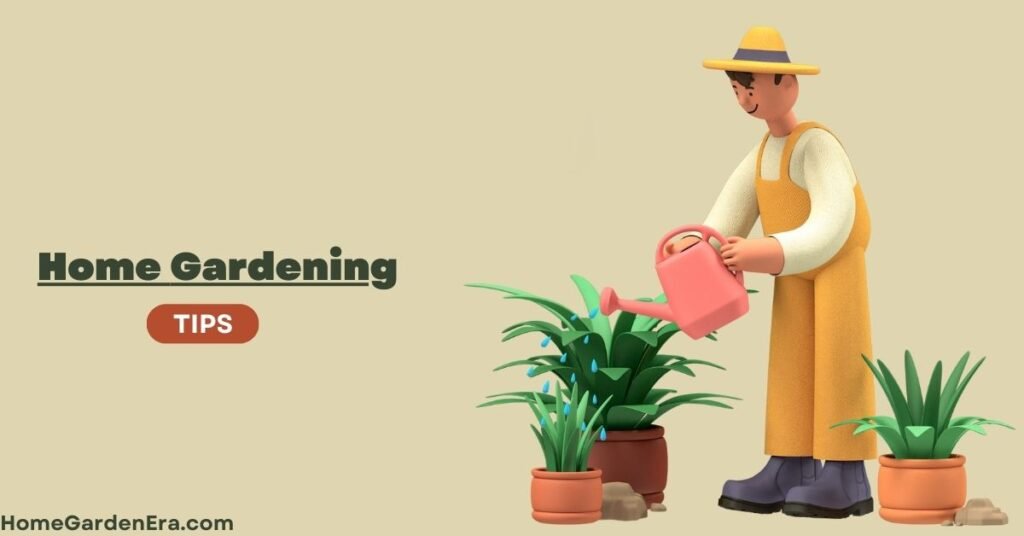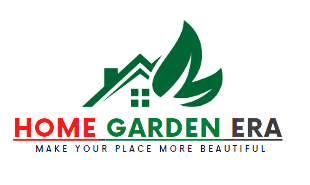Home Gardening is a very popular hobby these days, which has many benefits. Gardening provides a great opportunity for you to spend time, get exercise, and enjoy fresh produce.
Whether you are an experienced or beginner gardener. If you are also trying to make your home garden even better, then this article is for you.
In this article, we’ll share modern Home Gardening Tips and 10 simple ways to improve your Home Garden.
Home Gardening Tips
Gardening is a pleasant and beneficial activity for us. It is an action in which we make our home and the places around it beautiful.
Through home gardening we grow flowers, plants and vegetables in our house or premises.

Gardening is becoming very popular among people as a fulfilling and rewarding hobby.
Home Garden is such an art, in which we interact with nature and stay connected with it. Through this art we can make our land very beautiful and productive.
To do your normal home gardening you need to know a few things. Even beginners can behave like a professional gardener by following these tips.
In this article, we will provide you some of the best home gardening tips to improve your home garden.
Choose the Right Location
One of the most important factors in creating a successful home garden is choosing the right location.
Plants generally require at least 6-7 hours of direct sunlight in a day, so choose a location that gets enough sunlight daily.
You should choose a site that has high quality soil as well as good drainage. If the soil quality is poor or there is a drainage problem, you should use raised beds or man-made containers instead.
Start with Good Soil
Good soil quality and its productive capacity are very important for healthy horticulture.
Before planting, be sure to test the soil to determine its pH level, fertility and nutrient content.
You can test this by visiting a local garden center or by purchasing a soil testing kit online.
After knowing the soil quality, you should amend your soil with compost or other organic matter to improve its quality.
Choose the Right Plants
The selection of plants should be done very carefully and efficiently. Choosing the wrong plant can make all your hard work go waste.
Because not all plants are the same, some plants will do best under their own special conditions.
Keep the following things in mind while selecting plants for your home garden.
- Climate
- Soil Quality
- Sunlight
- Water availability
Select plants that suit you in the above points and that you are interested in growing.
Practice Companion Planting
Companion planting is the process of growing different plants together, so that all the plants together benefit each other.
For example, companion planting of carrots and onions.
The smell of onion keeps insects away from the carrot, while the smell of carrot keeps the flies away from the onion.
You should do a little research before using this method. While researching, keep in mind that which plant will prove to be more beneficial with which plant.
Only after choosing the right plant, include it in your home gardening.
Water Your Plants Properly
You must have heard a saying that “water is life”.
Proper water management is very important for healthy gardening. Most plants found in nature require about an inch of water per week, this can also vary depending on the climate and soil type present there.
Proper watering helps plants in the following ways.
- Maintaining cell turgor for plant structure and growth
- Transport of organic compounds and nutrients throughout the plant
- Most important in the chemical process of photosynthesis
Proper quantity should be taken care of while giving water to the plants. Too much water can damage plants.
Mulch Your Garden
Mulching your garden is an excellent way to improve soil quality, retain moisture and reduce weed growth.
Through this, the soil of home gardening is covered with a layer of organic or inorganic substances.
You can make mulch from straw, leaves, wood chips, grass, bark, and small clumps of soil.
Mulching serves the following purpose in your home gardening.
- improve soil quality
- retain moisture
- controlling soil temperature
- inhibit weed growth
- enhance the beauty of the garden
When applying mulch around plants, be careful not to cover the stems or leaves. keep mowing and pruning mulch from time to time.
Prune Your Plants
Pruning is the process of removing bad or diseased branches from your plants.
You can also cut and prune the plants to give them a definite and beautiful shape.
You should prune your plants regularly for the following reasons.
- to maintain plant health
- to promote development in a certain direction
- to prevent the spread of disease
- Controlling plant size
- To encourage new growth.
Pruning should be done very carefully as wrong pruning can also damage the plants.
For this you should take advice from horticulture expert or do some research on your own.
Fertilize Your Plants
Fertilization is the process of adding essential nutrients to the soil to make plants healthy and grow.
It is needed because the soil alone cannot provide all the nutrients necessary for the complete development of plants.
With the help of fertilizers, we help in supplementing the soil with essential nutrients.
At present, mainly two types of fertilizers are in vogue.
- Natural fertilizers
- chemical fertilizers
While using fertilizers, care should be taken of the macro-nutrients (such as nitrogen, phosphorus and potassium) and micro-nutrients (such as iron, zinc and copper) present in them.
You should use fertilizers according to the requirement of the soil and plants of your home gardening.
Control Pests and Diseases
In Gardening, the most damage to plants is caused by diseases and pests.
Pests and diseases in plants produce various organisms or pathogens that can infect or destroy plants.
Due to this, their yield potential decreases, the quality of the crop deteriorates.
Pests that can damage home gardening can include insects, mites, nematodes, rodents, and other animals.
Which destroy the leaves, stems, roots, flowers and fruits of your plants by eating them.
On the other hand, your plant can get quite serious diseases caused by fungi, bacteria, viruses or microorganisms.
These diseases target plant tissues, causing the appearance of spots, blight, wilting or rotting of your plant’s leaves.
Common plant diseases include powdery mildew, rust, verticillium wilt and bacterial canker.
Generally, both pests and diseases spread very fast in the home garden. Because of which it is a bit difficult to control them.
For this reason, we should identify the problem at the right time and take preventive measures.
For this you can also take the advice of an expert like ikea etc.
Enjoy Your Garden!
Last but not least, remember to enjoy your HOME Garden! Gardening can be hard work, but it’s also a fun and rewarding hobby.
Take the time to appreciate the beauty of your plants, and enjoy the fruits and vegetables
Conclusion
Home Gardening Tips can transform your outdoor space into a beautiful, green haven. We’ve shared 10 simple ways to help you get started.
Have questions or need personalized gardening advice? Contact us today — we’re always here to help you grow better.
